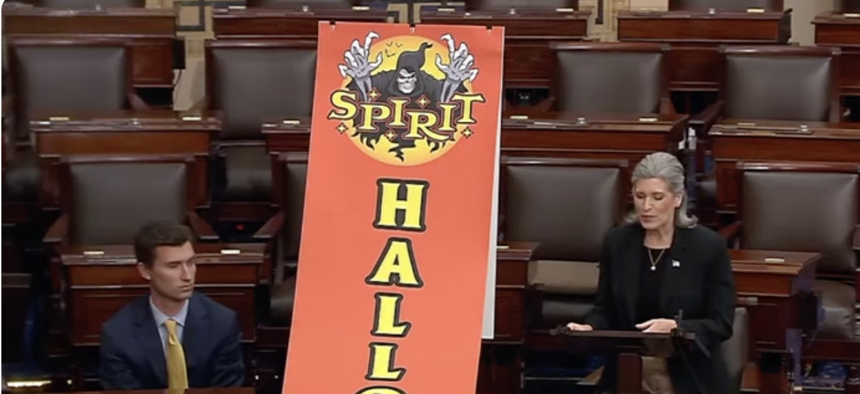
Sen. Joni Ernst, R-Iowa, speaks on the Senate floor on Oct. 30, arguing that Spirit Halloween stores could be an ideal for federal real estate. Screengrab / GovExec
Senator argues that federal agencies should be more like Spirit Halloween, at least when it comes to real estate
While the Trump administration is prioritizing rightsizing the federal real estate portfolio, it has pared back several more aggressive efforts to offload property.
Sen. Joni Ernst, R-Iowa, cited Halloween — specifically costume store Spirit Halloween’s business model of temporarily taking over vacant retail space around the holiday — as an ideal for slashing the number of federal buildings that agencies own, a priority of the second Trump administration.
“Spirit Halloween’s successful ‘body-snatching’ business model scares up a great idea for reviving the government’s graveyard of lifeless real estate. Let’s sell off these haunted houses to businesses who can breathe new life into them,” she said in a Senate floor speech Thursday. “That trick would be a real treat for taxpayers because it would both reduce costs and bring in billions of dollars from monstrous sales. It’s an idea only a zombie wouldn’t like, since it’s such a no-brainer.”
Specifically, Ernst touted her Disposing of Inactive Structures and Properties by Offering for Sale and Lease (DISPOSAL) Act (S. 3091) that would mandate the sale or lease of six federal buildings in Washington, D.C.
Some of the buildings, however, are already slated to be offloaded. The Housing and Urban Development Department in April announced that it would dispose of its headquarters, the Robert C. Weaver Federal Building, due to more than $500 million in deferred maintenance and modernization needs as well as the agency’s workforce only taking up half of the building’s space.
While Ernst’s bill would require the axing of the Agriculture Department’s South Building, one of two D.C. headquarters for USDA, the department is already vacating that space as part of a consolidation effort.
Still, her measure would:
- Exempt sales or leases of these buildings from certain requirements, such as those under the National Environmental Policy Act.
- Specify that proceeds from such disposals would go toward relocating agencies and deficit reduction.
- Direct the General Services Administration to list for offloading up to 20 federal buildings that have an average utilization rate of less than 60% annually through 2028.
Ernst’s bill has been referred to the Senate Environment and Public Works Committee.
Edward Forst, President Trump’s nominee to lead the GSA, said at his confirmation hearing on Oct. 23 that the agency manages about 8,800 federal properties that have $24 billion in deferred maintenance costs.
“I think we have to take stock of exactly what we own, the mission of each one of our constituent clients and then determine the appropriate way to move forward,” he said, signaling a less aggressive approach to downsizing the federal real estate portfolio by the administration.
Michael Peters, who served as head of GSA’s Public Buildings Service under Trump before resigning in July, had said that the portfolio could be halved. PBS is currently being led by Deputy Commissioner Andrew Heller in an acting capacity.
Robin Carnahan, who was Biden’s GSA administrator, said at the end of her tenure that the federal government could reduce its portfolio by 30%.
GSA in March listed more than 440 “non-core” government buildings for potential sale, but took it down one day later after deciding “to use a more incremental approach focusing on a shorter list of assets that have already been evaluated.”
The agency currently has 45 federal buildings identified for “accelerated disposition.”
Additionally, Federal News Network reported in September that hundreds of laid off PBS employees were invited to return to their jobs.
Share your experience with us: Sean Michael Newhouse: snewhouse@govexec.com, Signal: seanthenewsboy.45
NEXT STORY: Contractors fear retaliation if they try to recover shutdown costs







